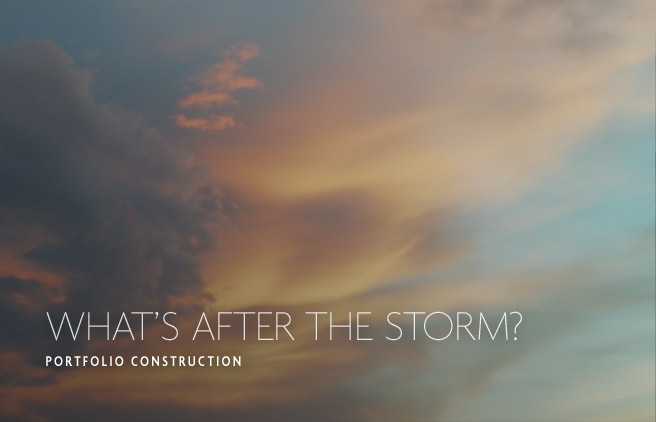
What’s After the Storm?
We have spent enough time discussing the immediate challenges in the markets. Investors should not lose sight of the long-term opportunities ahead.
1. Interest rates will be lower than normal.
Generally speaking, developed economies have to contend with an aging and declining cohort within their population. This group pushes demand for interest bearing assets higher than normal, subsequently pushing yields lower. In addition, central banks are more likely to prioritize economies and employment over prices.
After several rounds of quantitative easing, debt levels are also too high to tolerate higher interest rates. Even though we are seeing rapid moves in interest rates, the terminal rates will still be below normal. Fixed income is no longer the perfect buy-and-hold investment given the low yields and volatility. Investors need to trade fixed income assets for cash or equity periodically.
2. Geopolitical tensions have increased.
We have had economic integrations but many countries involved are still behind in terms of policies, democracy, and human rights. The recent Russia/Ukraine incident reminds us that some of these countries do not share the same values. We are seeing more separations between the two blocks: the G7 (Canada, France, Germany, Italy, Japan, the UK and the US) and the BRIC (Brazil, Russia, India and China), which account for roughly 70% of the global Gross Domestic Product (GDP). At the same time, there is more policy coordination within countries of the same block. The US, as leader of the G7 block, raised tariffs on Chinese goods and the entire G7 has also sanctioned Russia this year. We expect tensions to only grow between the two blocks until we share the same values.
Geopolitical tensions heavily impact investors’ decisions in regard to geographical allocations and risk assessment. In addition, the role of the US dollar as the world currency will diminish as the BRIC grows.
3. Technology will continue to change our lifestyle.
Technology is not just everything inside a personal computer. As a matter of fact, demand for personal computers has declined consistently. Technological advancement has been led by software, which has become increasingly integrated into our everyday life: doorbells, driver assistance in our cars, apps in our phones, etc. Software is constantly being “optimized” for consumer use to reduce our mistakes and enhance our productivity. We may see slowdown in global economies as interest rates rise but the tech wave will continue as we have all become addicted! The race between humans and “robots” started a while ago. The major issue for humans is we are limited to 24 hours a day; when we sleep, we stop producing. What one person can do becomes very limited. The only winners are the humans that own robots.
We continue to believe a portion of the investment portfolios should be invested in technology companies that dominate and continue to evolve. Obviously, certain things remain very labour intensive. For example, you can’t construct a building virtually or without physical labour. Therefore, the cost will remain high. Real estate prices simply cannot fall just because we want them to.
4. Fight for climate change will not be disrupted by temporarily higher prices.
Creating a cleaner world for our children actually requires the burning of oil .As a result, we are expecting higher oil and commodity prices as the world rebuilds new infrastructure. Unfortunately, this leads to inflation which offsets some of the deflationary benefit of technology. Even though inflation is very high globally today, it is not stopping the world leaders from battling climate change and pursuing clean energy.
5. The new generations are pursuing a “minimalistic” lifestyle.
Young people these days prefer a simple “minimalistic” lifestyle. They are more willing to rent than to own. They prefer Uber for transportation, rent or Airbnb for their accommodation needs, and wear plain clothing that is endorsed by their friends on Instagram. What this tells us is that younger consumers are less willing to pay for customization and options as they are not eager to stand out. Consider the most popular vehicle: the Tesla Model S. It is plain outside and inside, and most importantly, the body style has not changed since 2012 when it was first launched. Most vehicles would have gone through at least two major overhauls and four facelifts in ten years.
From an investment perspective, this means the universe of companies will continue to shrink and the “losers” will pay for the growth of the “winners”. We’ve seen this trend in the last decade and it will only intensify. Investing “for “reversion-to-mean” becomes tricky.
The bottom line is, if you have a solid investment philosophy that is forward-looking, you should not waste your energy worrying about the volatility of the markets. We are in the eye of the storm with very high inflation, very aggressive interest rate hikes and growing risk of recession. What’s next is more important.
 By Alfred Lam, CFA, Senior Vice-President and Chief Investment Officer, CI GAM | Multi-Asset Management
By Alfred Lam, CFA, Senior Vice-President and Chief Investment Officer, CI GAM | Multi-Asset Management
This document is intended solely for information purposes. It is not a sales prospectus, nor should it be construed as an offer or an invitation to take part in an offer. This report may contain forward-looking statements about one or more funds, future performance, strategies or prospects, and possible future fund action. These statements reflect the portfolio managers’ current beliefs and are based on information currently available to them. Forward-looking statements are not guarantees of future performance. We caution you not to place undue reliance on these statements as a number of factors could cause actual events or results to differ materially from those expressed in any forward-looking statement, including economic, political and market changes and other developments. CI Assante Wealth Management and its dealer subsidiaries, Assante Capital Management Ltd. and Assante Financial Management Ltd. (collectively “Assante”) are affiliates of CI GAM | Multi-Asset Management, which is a division of CI Global Asset Management. Evolution Private Managed Accounts are managed by CI Global Asset Management under the United Financial brand and are available exclusively through your Assante advisor. Neither CI Global Asset Management nor its affiliates or their respective officers, directors, employees or advisors are responsible in any way for damages or losses of any kind whatsoever in respect of the use of this report. Commissions, trailing commissions, management fees and expenses may all be associated with investments in mutual funds and the use of the Asset Management Service. Any performance data shown assumes reinvestment of all distributions or dividends and does not take into account sales, redemption or optional charges or income taxes payable by any securityholder that would have reduced returns. Mutual funds are not guaranteed, their values change frequently and past performance may not be repeated. Please read the fund prospectus and consult your advisor before investing. CI Assante Wealth Management is a registered business name of Assante Wealth Management (Canada) Ltd. CI Global Asset Management is a registered business name of CI Investments Inc. This report may not be reproduced, in whole or in part, in any manner whatsoever, without prior written permission of CI Assante Wealth Management. Copyright © 2021 CI Assante Wealth Management. All rights reserved.
We have spent enough time discussing the immediate challenges in the markets. Investors should not lose sight of the long-term opportunities ahead.
1. Interest rates will be lower than normal.
Generally speaking, developed economies have to contend with an aging and declining cohort within their population. This group pushes demand for interest bearing assets higher than normal, subsequently pushing yields lower. In addition, central banks are more likely to prioritize economies and employment over prices.
After several rounds of quantitative easing, debt levels are also too high to tolerate higher interest rates. Even though we are seeing rapid moves in interest rates, the terminal rates will still be below normal. Fixed income is no longer the perfect buy-and-hold investment given the low yields and volatility. Investors need to trade fixed income assets for cash or equity periodically.
2. Geopolitical tensions have increased.
We have had economic integrations but many countries involved are still behind in terms of policies, democracy, and human rights. The recent Russia/Ukraine incident reminds us that some of these countries do not share the same values. We are seeing more separations between the two blocks: the G7 (Canada, France, Germany, Italy, Japan, the UK and the US) and the BRIC (Brazil, Russia, India and China), which account for roughly 70% of the global Gross Domestic Product (GDP). At the same time, there is more policy coordination within countries of the same block. The US, as leader of the G7 block, raised tariffs on Chinese goods and the entire G7 has also sanctioned Russia this year. We expect tensions to only grow between the two blocks until we share the same values.
Geopolitical tensions heavily impact investors’ decisions in regard to geographical allocations and risk assessment. In addition, the role of the US dollar as the world currency will diminish as the BRIC grows.
3. Technology will continue to change our lifestyle.
Technology is not just everything inside a personal computer. As a matter of fact, demand for personal computers has declined consistently. Technological advancement has been led by software, which has become increasingly integrated into our everyday life: doorbells, driver assistance in our cars, apps in our phones, etc. Software is constantly being “optimized” for consumer use to reduce our mistakes and enhance our productivity. We may see slowdown in global economies as interest rates rise but the tech wave will continue as we have all become addicted! The race between humans and “robots” started a while ago. The major issue for humans is we are limited to 24 hours a day; when we sleep, we stop producing. What one person can do becomes very limited. The only winners are the humans that own robots.
We continue to believe a portion of the investment portfolios should be invested in technology companies that dominate and continue to evolve. Obviously, certain things remain very labour intensive. For example, you can’t construct a building virtually or without physical labour. Therefore, the cost will remain high. Real estate prices simply cannot fall just because we want them to.
4. Fight for climate change will not be disrupted by temporarily higher prices.
Creating a cleaner world for our children actually requires the burning of oil .As a result, we are expecting higher oil and commodity prices as the world rebuilds new infrastructure. Unfortunately, this leads to inflation which offsets some of the deflationary benefit of technology. Even though inflation is very high globally today, it is not stopping the world leaders from battling climate change and pursuing clean energy.
5. The new generations are pursuing a “minimalistic” lifestyle.
Young people these days prefer a simple “minimalistic” lifestyle. They are more willing to rent than to own. They prefer Uber for transportation, rent or Airbnb for their accommodation needs, and wear plain clothing that is endorsed by their friends on Instagram. What this tells us is that younger consumers are less willing to pay for customization and options as they are not eager to stand out. Consider the most popular vehicle: the Tesla Model S. It is plain outside and inside, and most importantly, the body style has not changed since 2012 when it was first launched. Most vehicles would have gone through at least two major overhauls and four facelifts in ten years.
From an investment perspective, this means the universe of companies will continue to shrink and the “losers” will pay for the growth of the “winners”. We’ve seen this trend in the last decade and it will only intensify. Investing “for “reversion-to-mean” becomes tricky.
The bottom line is, if you have a solid investment philosophy that is forward-looking, you should not waste your energy worrying about the volatility of the markets. We are in the eye of the storm with very high inflation, very aggressive interest rate hikes and growing risk of recession. What’s next is more important.
 By Alfred Lam, CFA, Senior Vice-President and Chief Investment Officer, CI GAM | Multi-Asset Management
By Alfred Lam, CFA, Senior Vice-President and Chief Investment Officer, CI GAM | Multi-Asset Management
This document is intended solely for information purposes. It is not a sales prospectus, nor should it be construed as an offer or an invitation to take part in an offer. This report may contain forward-looking statements about one or more funds, future performance, strategies or prospects, and possible future fund action. These statements reflect the portfolio managers’ current beliefs and are based on information currently available to them. Forward-looking statements are not guarantees of future performance. We caution you not to place undue reliance on these statements as a number of factors could cause actual events or results to differ materially from those expressed in any forward-looking statement, including economic, political and market changes and other developments. CI Assante Wealth Management and its dealer subsidiaries, Assante Capital Management Ltd. and Assante Financial Management Ltd. (collectively “Assante”) are affiliates of CI GAM | Multi-Asset Management, which is a division of CI Global Asset Management. Evolution Private Managed Accounts are managed by CI Global Asset Management under the United Financial brand and are available exclusively through your Assante advisor. Neither CI Global Asset Management nor its affiliates or their respective officers, directors, employees or advisors are responsible in any way for damages or losses of any kind whatsoever in respect of the use of this report. Commissions, trailing commissions, management fees and expenses may all be associated with investments in mutual funds and the use of the Asset Management Service. Any performance data shown assumes reinvestment of all distributions or dividends and does not take into account sales, redemption or optional charges or income taxes payable by any securityholder that would have reduced returns. Mutual funds are not guaranteed, their values change frequently and past performance may not be repeated. Please read the fund prospectus and consult your advisor before investing. CI Assante Wealth Management is a registered business name of Assante Wealth Management (Canada) Ltd. CI Global Asset Management is a registered business name of CI Investments Inc. This report may not be reproduced, in whole or in part, in any manner whatsoever, without prior written permission of CI Assante Wealth Management. Copyright © 2021 CI Assante Wealth Management. All rights reserved.





